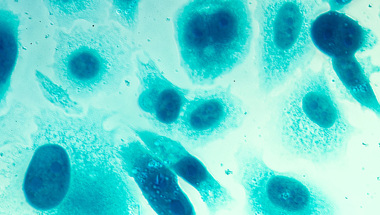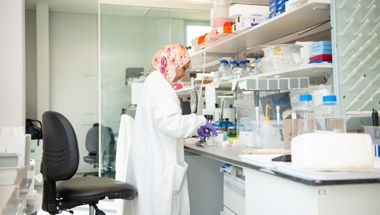
How does prostate cancer become resistant to treatment, and can we find a way to stop it?

Grant information
Researcher: Dr Rayzel Fernandes
Institution: Imperial College London
Grant award: £349,662
Reference: TLD-CAF23-003
What you need to know
- One way that prostate cancer can become resistant to treatment is by activating parts of its DNA, known as super-enhancers, to fuel its growth.
- Dr Fernandes will study molecules that prostate cancer can use to activate these super-enhancer regions, and find out which molecules are most important in this process.
- She will then test ways to stop these molecules, either alone or with existing treatments, on 3D tumours grown in the lab, to see if they could become future treatments.
About Dr Rayzel Fernandes
Dr Fernandes completed her bachelor’s degree in biotechnology at Manipal University, India, followed by a master’s in medical biotechnology at the same institution. She then spent a number of years as a Research Assistant before moving to the University of Adelaide, Australia, to undertake a PhD in prostate cancer research.
Her PhD looked at how prostate cancer progresses and becomes resistant to treatments, and how this is linked to a group of molecules called microRNAs. These small molecules regulate the genes in our cells, fine-tuning our body’s processes to ensure everything is working as it should. But in prostate cancer, microRNAs can help the disease grow more quickly, or adapt to the treatment used against it.
Since finishing her PhD in 2020, Dr Fernandes has been working as a postdoctoral researcher at Imperial College London, where she will be based for this project. In that time, Dr Fernandes has been working in the lab of Professor Charlotte Bevan, studying other ways gene regulation affects the development of prostate cancer, and looking for new ways to treat the disease. This grant will enable her to extend this promising research as an independent researcher.
With this Career Acceleration Fellowship, I will be able to drive forward innovative research initiatives that make a lasting impact on prostate cancer research and ultimately enhance the outcomes and quality of life for people affected by prostate cancer.
What will Dr Rayzel Fernandes do?
Dr Fernandes aims to understand why some prostate cancers become resistant to treatment. Her project will focus on specific regions in the DNA, called 'super-enhancers', that can switch on genes that can help cancer grow.
To do this, Dr Fernandes will take a step back and look at what switches these super-enhancer regions on in the first place. This includes DNA-like molecules of genetic material called long non-coding RNAs (or lncRNAs for short).
To study lncRNAs and their role in prostate cancer, Dr Fernandes will look at genetic data from existing prostate cancer sample databases. She will compare how the lncRNAs and the super-enhancer regions of DNA change over the course of the disease, including as it becomes resistant to treatment.
This will help her narrow down which lncRNAs are most important in treatment resistance, and she will test this by measuring their levels in prostate cancer cells grown in the lab.
With this information, she will study whether reducing the levels of these specific lncRNAs makes prostate cancer respond better to existing treatments.
Once she knows which lncRNAs are most promising to target, she will test her results in lab-grown ‘miniature tumours’, known as organoids. These organoids are 3D models of advanced prostate cancer, and give researchers a more accurate idea of how the disease responds in real life than cells grown flat in a dish – making it easier to move the research into mice and, later, men with prostate cancer if the results are promising.
For this project, Dr Fernandes will work closely with Professor Wilbert Zwart at the Netherlands Cancer Institute. As well as regular virtual meetings with Professor Zwart, Dr Fernandes will spend two two-month placements in his lab, learning new techniques for analysing her prostate cancer samples, so she can understand the processes that drive the disease’s resistance to treatment.
How will this benefit men?
When prostate cancer becomes resistant to current treatments, it leaves men with limited options.
By improving our understanding of how prostate cancer becomes resistant to treatment, Dr Fernandes’s research could lead to new and more effective treatments for advanced prostate cancer.
This means that more men could live longer and have a better quality of life.
Help us fund more research like this
Your donation helps us fund lifesaving research into better treatments for prostate cancer.



